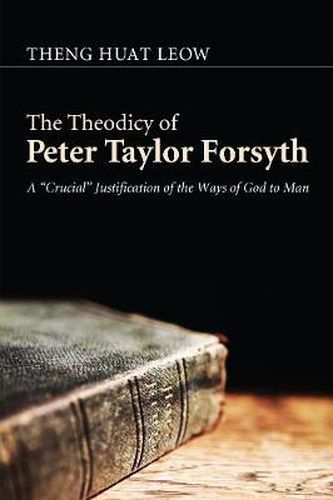Readings Newsletter
Become a Readings Member to make your shopping experience even easier.
Sign in or sign up for free!
You’re not far away from qualifying for FREE standard shipping within Australia
You’ve qualified for FREE standard shipping within Australia
The cart is loading…






This title is printed to order. This book may have been self-published. If so, we cannot guarantee the quality of the content. In the main most books will have gone through the editing process however some may not. We therefore suggest that you be aware of this before ordering this book. If in doubt check either the author or publisher’s details as we are unable to accept any returns unless they are faulty. Please contact us if you have any questions.
The theodicy of the remarkable Scottish Congregationalist theologian Peter Taylor Forsyth has long been recognized as a vital and significant contribution to twentieth-century theology. Up until now, however, there has not been a substantial full-length treatment of Forsyth’s work on the problem of evil. The Theodicy of Peter Taylor Forsyth fills this lacuna by setting out, in a fairly systematic and comprehensive manner, Forsyth’s justification of God in the face of evil. In so doing, it also illuminates several other related areas of his thought, such as his epistemology and Christology, as well as his understanding of sin, the atonement, providence, divine passibility, human origins, and the God-world relationship. Bringing Forsyth’s approach to the subject into conversation with other prominent thinkers like Leibniz, Dostoyevsky, Camus, Moltmann, Hick, Bauckham, and Fiddes, this book also suggests ways in which Forsyth’s justification of God contributes to the current state of Christian theodicy. It highlights Forsyth’s ability to integrate insights from different approaches, even those that have hitherto generally been considered diametrically opposed notions. Forsyth’s theodicy therefore presents an integrative approach to the topic, with every theme flowing from and returning to a clear center: the cross of Christ. As the book also makes clear, Forsyth considers theodicy to be an immensely practical discipline, with significant implications for human life. In every sense, therefore, it constitutes a crucial justification of the ways of God to humanity.
$9.00 standard shipping within Australia
FREE standard shipping within Australia for orders over $100.00
Express & International shipping calculated at checkout
This title is printed to order. This book may have been self-published. If so, we cannot guarantee the quality of the content. In the main most books will have gone through the editing process however some may not. We therefore suggest that you be aware of this before ordering this book. If in doubt check either the author or publisher’s details as we are unable to accept any returns unless they are faulty. Please contact us if you have any questions.
The theodicy of the remarkable Scottish Congregationalist theologian Peter Taylor Forsyth has long been recognized as a vital and significant contribution to twentieth-century theology. Up until now, however, there has not been a substantial full-length treatment of Forsyth’s work on the problem of evil. The Theodicy of Peter Taylor Forsyth fills this lacuna by setting out, in a fairly systematic and comprehensive manner, Forsyth’s justification of God in the face of evil. In so doing, it also illuminates several other related areas of his thought, such as his epistemology and Christology, as well as his understanding of sin, the atonement, providence, divine passibility, human origins, and the God-world relationship. Bringing Forsyth’s approach to the subject into conversation with other prominent thinkers like Leibniz, Dostoyevsky, Camus, Moltmann, Hick, Bauckham, and Fiddes, this book also suggests ways in which Forsyth’s justification of God contributes to the current state of Christian theodicy. It highlights Forsyth’s ability to integrate insights from different approaches, even those that have hitherto generally been considered diametrically opposed notions. Forsyth’s theodicy therefore presents an integrative approach to the topic, with every theme flowing from and returning to a clear center: the cross of Christ. As the book also makes clear, Forsyth considers theodicy to be an immensely practical discipline, with significant implications for human life. In every sense, therefore, it constitutes a crucial justification of the ways of God to humanity.